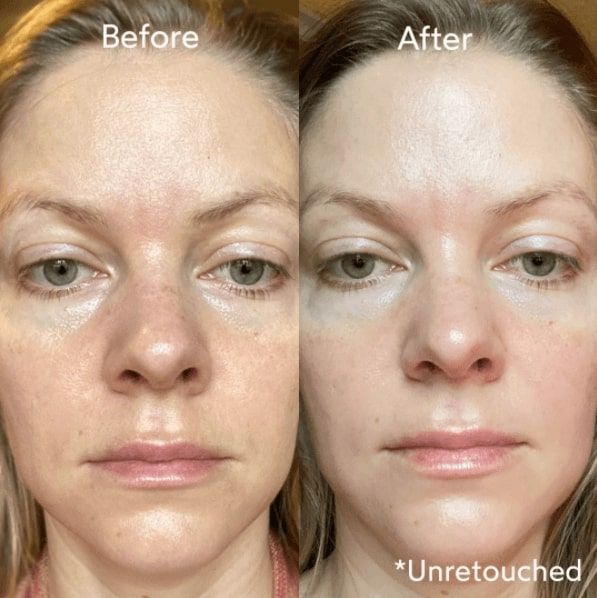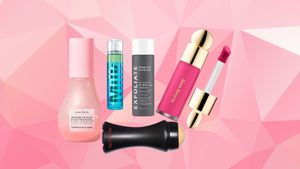Vitamin C is an essential vitamin that your body needs for many reasons. However, you may not know that it also has a lot of benefits when used in skincare products! There are 3 main benefits to using Vitamin C in your skincare routine: brighter skin, reduced wrinkles, and improved collagen production. This blog post will explore each one of these benefits and show how to incorporate Vitamin C into your skincare routine so you can enjoy the best results!🍋🍋🍋
Vitamin C for skincare: do you need it in your life?
Topical vitamin C is used in lots of different skincare products, and for good reason. It’s recommended as a solution for everything from uneven skin tone, rough texture, dullness, scarring and fine lines. It’s usage to improve skin health is also backed by research. Vitamin C for skin health is even great for glow, reducing the appearance of undereye circles and reduces redness too.
As we age, the vitamin C skin levels found naturally decline – particularly if skin is exposed to UV damage and pollution. This decline can make skin look and feel dull, uneven and less firm.
The good news is that you can add vitamin C as a topical treatment to shield skin from environmental stress, as well as treat the effects. It helps to prevent and treat all at once, keeping skin looking younger and improving its appearance for longer. It can even help with wound-healing, improving skin barrier, and sunburn.
The other good news is that it is suitable for most skin types too.
Because it is highly acidic, its topical usage also encourages skin to produce collagen and elastin –both of which occur naturally in the skin and are essential for plumping, firming, and keeping premature aging at bay.

Common types of vitamin C in skin care
There are lots of different types of vitamin C used in skin care and while they all have skin benefits, some of them work better than others, particularly if you have specific skin concerns.
Ascorbic acid (also known as L-ascorbic acid) has the most skincare-related research when it comes to types of vitamin C. The pH in topical ascorbic acid creates younger-looking and firmer feeling skin along with fading uneven skin tone and spots and helping the skin’s surface to defend itself.
There are some other types of vitamin C that have research-based backing for skincare that you should look for when you’re choosing a vitamin C product for your routine, these include:
- Sodium ascorbyl phosphate
- Ascorbyl palmitate
- 3-O ethyl ascorbic acid
- Tetrahexyldecyl ascorbate
- Magnesium ascorbyl phosphate
- Ascorbyl glucoside
Just a little note: magnesium ascorbyl phosphate has a hydrating effect on skin too – it decreases transepidermal water loss, which helps skin to retain moisture better. So if it’s hydration that you’re looking for, this could be a good choice.
Concentrations of 10% or more vitamin C are the most effective when it comes to skin benefit but go easy. A lightweight 15% serum can help with dull or uneven skin, whereas a richer-textured 25% vitamin c concentration can work better for dark spots, discoloration and dullness. Vitamin C can also inhibit melanin production to reduce hyperpigmentation – regular use can stop dark spots from forming in the first place.
Even lower concentrations (as low as 0.6%) can help to provide benefits to the skin and provide cumulative benefits. Lower strengths of vitamin C also work with other ingredients like retinol and ceramides to further benefit anti-aging results but you should leave 30 mins between combining these products with your vitamin C.
It also works well in skin care routine alone with vitamin E, ferulic acid, vitamin B, and hyaluronic acid to provide a host of benefits.
It’s worth noting that the best packaging and storage for topical vitamin C products are opaque, air-restrictive bottles or pump containers. Vitamin C serum and other products are sensitive to air and light and will break down if it’s exposed to them regularly. If your product is in a jar, it probably won’t remain stable for as long as you need it to.
Check there’s no discoloration or sour odors when you grab your vitamin C, as this could be a sign that it’s oxidized and no longer effective.
How to use vitamin C in your skin care routine
Although topical vitamin C is usually ok for most skin types, all skin products have the potential to cause an allergic reaction and it makes sense to patch test to check ahead of time. Here’s how:
- Select an area of your skin that’s easy to conceal (such as your forearm)
- Apply a small amount of product and wait for 24 hours
- If there are no side effects, you’re all good to go ahead and apply to your face. If any reactions – such as a rash, redness, or hives – occur, stop use immediately
Now that you’ve done your patch test, let’s move on to how you can incorporate vitamin C into your skincare routine.
You can use vitamin C twice a day, ideally morning and night. There’s some discussion about whether vitamin C is most effective in the morning, so if you only want to use it once a day then add it in the AM.
Cleanse, tone and exfoliate then apply the rest of your products in order of texture (thinnest to thickest). Always finish your routine with a moisturizer with SPF; your vitamin C should be layered underneath your moisturizer.
Most dermatologists recommend using a vitamin C serum rather than a cream or toner to get your vitamin C fix but you can use other product types if they’re more effective for you. You should only need a few drops, and it’s usually best to start with a low concentration and work your way up then go straight in with the big guns. You want to help your skin to get accustomed to your new routine - this is even more important if you have sensitive or reactive skin.
If you have really sensitive skin, avoiding products with L-ascorbic acid is usually a good idea as this can make sensitive skin struggle. Try magnesium ascorbyl phosphate instead as this may be less likely to cause irritation or a reaction in your skin.
Avoid using your vitamin C with benzoyl peroxide, as this can make it less potent. Alternate between morning and evenings, or different days, if you have to use both. It’s not necessarily an either/or decision.
So, do you need vitamin C serum in your life?
Vitamin C can help to heal, reduce hyperpigmentation, increase glow and keep your skin protected and in great condition. Many people swear by it, it’s effective, backed by research, and readily available. If you’re finding that your skin is dull or discolored, then this could be the product for you.
It’s key to be consistent with your skincare routine and the inclusion of vitamin C. Most skincare changes don’t have an effect overnight, so you’ll need to try it for a longer period to see if it’s effective for your skin.
FAQ
How does vitamin C help skin?
Vitamin C is good for your skin in a few ways:
It is a great way to boost collagen production and reduce chances of premature aging, which smooths out lines and wrinkles; it’s also good for brightening the complexion, balancing uneven pigmentation or redness in skintone and reducing hyperpigmentation.
Vitamin C is a potent antioxidant, which means it can help to fight free radicals and protect your skin from environmental damage such as pollution or UV rays. This also has the effect of slowing down the aging process in skin cells by reducing inflammation and increasing collagen production.
When should I use vitamin C?
It is best used when you need a boost for dull or tired skin. If you’re looking for a way to brighten skin, fade dark spots or pigmentation and fight signs of ageing then vitamin C is the product for you!
Does vitamin C make your skin better?
Yes! Vitamin C is very effective at treating signs of aging - reducing fine lines and wrinkles, smoothing out skin tone to reduce uneven pigmentation (including age spots), and helping with hyperpigmentation.
Does vitamin C lighten skin permanently?
No, vitamin C serum won’t help to lighten your skin permanently but it can be a great way of fading dark spots or pigmentation.
Vitamin C is good for:
- hyperpigmentation
- uneven skintone/uneven pigmentation
- fine lines and wrinkles
- anti-aging





